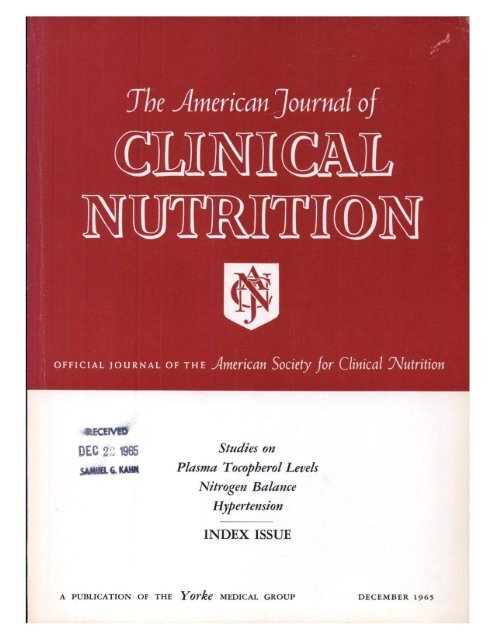65岁及以上短肠综合征患者的生存和肠外营养依赖:一项回顾性观察队列研究
IF 6.5
1区 医学
Q1 NUTRITION & DIETETICS
引用次数: 0
摘要
背景:家庭肠外支持(PS)是以短肠综合征(SBS)为主要病因的慢性肠衰竭(CIF)的标准治疗方法。然而,老年PS患者的预后研究仍然很少。方法:这项回顾性观察性研究评估了2015年至2020年间在法国国家CIF转诊中心新诊断为SBS-CIF启动PS的患者。患者被分为两组:≥65岁(老年组)。结果:我们纳入175例患者[中位年龄61岁(四分位数间距IQR: 46-70);58%的女性)。肠系膜缺血是CIF的主要原因(32%)。手术解剖包括空肠吻合术(47%)、空肠结肠吻合术(39%)和回肠结肠吻合术(14%)。老年患者[n=73, 42%,中位年龄72(68-76)]由放射性肠炎引起的动脉高血压、血脂异常、癌症和bs - cif发生率较高,但由克罗恩病引起的病例较少。中位随访27个月(95%CI = 22-32),生存概率为92% (95%CI = 88-97), PS依赖概率为68% (95%CI = 60-78),两组间差异无统计学意义。在老年患者中,空肠造口术的存在(HR: 3.4, 95% CI: 1.1-10.6)是PS依赖的独立预测因子,体重指数(BMI) < 22 (HR 10.9, 95% CI: 1.4-87.4)是死亡率的独立预测因子。14例患者(8%)接受teduglutide治疗,年龄组间无显著差异。结论:近半数接受PS治疗的SBS-CIF患者年龄≥65岁,其对PS的依赖和生存率与年轻患者相当。这些发现表明,年龄不应该成为PS发生的障碍。本文章由计算机程序翻译,如有差异,请以英文原文为准。
Survival and parenteral nutrition dependence in patients aged 65 y and older with short bowel syndrome: a retrospective observational cohort study
Background
Home parenteral support (PS) is the standard treatment of chronic intestinal failure (CIF) with short bowel syndrome (SBS) as the leading cause. However, outcomes of PS in older patients remain poorly studied.
Methods
This retrospective observational study evaluated patients with newly diagnosed SBS-CIF initiating PS between 2015 and 2020 at a national French CIF referral center. Patients were stratified into 2 groups: 65 y or older (older group) and younger than 65 y (younger group). Multivariate Cox regression identified predictors of mortality and PS dependence in older patients.
Results
We included 175 patients [median age: 61 y (IQR: 46–70 y); 58% female]. Mesenteric ischemia was the primary cause of CIF (32%). Surgical anatomy included jejunostomy (47%), jejunocolic (39%), and ileocolic anastomosis (14%). Older patients [n = 73 (42%); median age: 72 y; IQR: 68–76 y] had higher rates of arterial hypertension, dyslipidemia, cancer, and SBS-CIF caused by radiation enteritis, but fewer cases attributed to Crohn disease. After a median follow-up of 27 mo (95% confidence interval [CI]: 22, 32 mo), the probability of survival was 92% (95% CI: 88%, 97%), and the probability of PS dependence was 68% (95% CI: 60%, 785), with no significant difference between age groups. In older patients, the presence of a jejunostomy (hazard ratios [HR]: 3.4; 95% CI: 1.1, 10.6) was an independent predictor of PS dependence, and BMI of <22 kg/m2 (HR: 10.9; 95% CI: 1.4, 87.4) was an independent predictor of mortality. Fourteen patients (8%) were treated with teduglutide, with no significant difference between age groups.
Conclusions
Nearly half of patients with SBS-CIF on PS are aged 65 y or older, with PS dependence and survival rates comparable with those of younger patients. These findings suggest that age should not be a barrier to PS initiation.
求助全文
通过发布文献求助,成功后即可免费获取论文全文。
去求助
来源期刊
CiteScore
12.40
自引率
4.20%
发文量
332
审稿时长
38 days
期刊介绍:
American Journal of Clinical Nutrition is recognized as the most highly rated peer-reviewed, primary research journal in nutrition and dietetics.It focuses on publishing the latest research on various topics in nutrition, including but not limited to obesity, vitamins and minerals, nutrition and disease, and energy metabolism.
Purpose:
The purpose of AJCN is to:
Publish original research studies relevant to human and clinical nutrition.
Consider well-controlled clinical studies describing scientific mechanisms, efficacy, and safety of dietary interventions in the context of disease prevention or health benefits.
Encourage public health and epidemiologic studies relevant to human nutrition.
Promote innovative investigations of nutritional questions employing epigenetic, genomic, proteomic, and metabolomic approaches.
Include solicited editorials, book reviews, solicited or unsolicited review articles, invited controversy position papers, and letters to the Editor related to prior AJCN articles.
Peer Review Process:
All submitted material with scientific content undergoes peer review by the Editors or their designees before acceptance for publication.

 求助内容:
求助内容: 应助结果提醒方式:
应助结果提醒方式:


